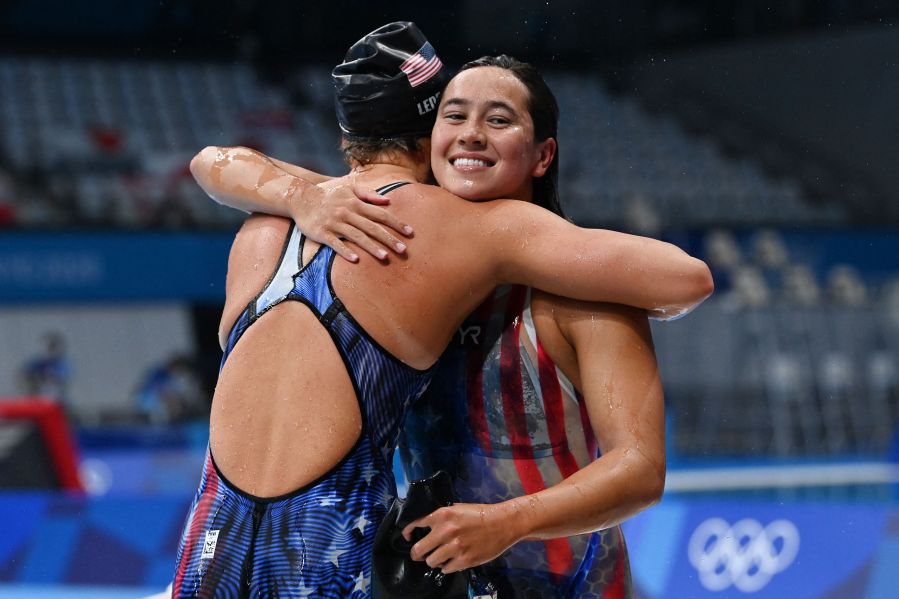Finally, a gold medal in Tokyo for Katie Ledecky.
The American star bounced back from the worst finish of her brilliant Olympic career to take the first-ever gold medal in the women’s 1,500-meter freestyle Wednesday.
It wasn’t quite the breeze that everyone expected in the metric mile. Ledecky built a big lead right from the start, then worked hard to hold off American teammate Erica Sullivan’s blazing finish.
But it was Ledecky touching first in 15 minutes, 37.39 seconds. Sullivan claimed the silver (15:41.41), while the bronze went to Germany’s Sarah Kohler (15:42.91).
“I think people maybe feel bad for that I’m not winning everything and whatever, but I want people to be more concerned about other things going on in the world, people that are truly suffering,” Ledecky said. “I’m just proud to bring home a gold medal to Team USA.”
It was quite a morning at the Tokyo Aquatics Centre for Ledecky, who seemed a bit overcome by the ups and downs she experienced in a little over an hour.

She tumbled over the lane rope to give Sullivan a hug, let out an uncharacteristic scream toward the American cheering section in the mostly empty arena and seemed to be holding back tears as she pulled her goggles back down over her eyes before exiting the pool.
In her first final of the day, Ledecky was blown away by her Australian rival, Ariarne Titmus, who made it 2-for-2 over the American with a victory in the 200 free.
Ledecky didn’t even win a medal — the first time that’s ever happened to her in an Olympic race. She was far behind all the way, never getting any higher than her fifth-place finish.
“After the 200, I knew I had to turn the page very quickly,” Ledecky said. “In the warm down pool I was thinking of my family. Kind of each stroke I was thinking of my grandparents.”
Her voice choked with emotion. She crunched her eyes trying not to cry.
“They’re the toughest four people I know,” Ledecky said, “and that’s what helped me get through that.”
The Australian known as the Terminator gave the Australian women their third individual swimming gold with an Olympic record of 1:53.50, adding to her thrilling victory in the 400 free.
In the longer race, Titmus conserved her energy over the first half, then rallied to pass Ledecky with the second-fastest performance in history.
Where was Ledecky in the 200?
Nowhere to be found.
The defending Olympic champion made the first flip in seventh place and finished in 1:55.21 — nearly 2 seconds behind the winner.
Siobhan Haughey of Hong Kong led much of the race before hanging on to take the silver in 1:53.92. The bronze went to Canada’s Penny Oleksiak in 1:54.70.
“Obviously having a great swim in the 400 gives me confidence coming into the 200,” Titmus said. “I thought my back end was definitely my strength in the 400. I knew I could have that on the way home in the 200.”
Titmus wasn’t all that pleased with her time, but it was good enough for another gold.
“Honestly, it’s not the time that I thought I could do this morning, but it’s the Olympics and there’s a lot of other stuff going on,” she said. “So it’s just about winning here. I’m very happy.”
Italy’s Federica Pellegrini of Italy finished seventh in her fifth and final Olympics. She won the gold in 2008 and is still the world-record holder.
The Americans also picked up a couple of medals in the women’s 200 individual medley — but not the one they wanted.
Japan’s Yui Ohashi completed her IM sweep by beating Americans Alex Walsh and Kate Douglass, adding to her victory in the 400.
The winning time was 2:08.52. Walsh claimed the silver in 2:08.65, while the bronze went to Douglass in 2:09.04.
Defending Olympic champion and world record-holder Katinka Hosszu of Hungary finished seventh. She was the oldest swimmer in the final at age 32.
There were no surprises in the men’s 200 butterfly, with Kristof Milak of Hungary romping to a dominating — but rather nerve-wracking — victory.
Milak won the the gold by about two body lengths despite having to hastily change suits before the race, which cost him a chance to break his own world record.
Milak said that he realized about 10 minutes before walking on deck that his suit was damaged. He told Hungarian reporters that he totally lost focus, though it was hard to tell from his performance in the pool.
He held up the suit in the mixed zone, putting a finger through the tear before tossing it on a table in disgust.
Milak still touched in an Olympic record of 1:51.25 — more than a half-second off his 2019 world record (1:50.73) but some 2 1/2 seconds ahead of the silver medalist.
Japan’s Tomoru Honda finished in 1:53.73, while the bronze went to Italy’s Federico Burdisso (1:54.45).
South African star Chad le Clos finished fifth. He won the 200 fly at the 2012 London Olympics, upsetting Michael Phelps, but was no match for the Hungarian star.
Caeleb Dressel breezed through the semifinals of the 100 free, his first of three individual events. The American star posted the second-fastest time (47.23), just behind Russia’s Kliment Kolesnikov (47.11).
“It’s been in Ohio as early as the mid-1850s at least, brought in as an ornamental plant because of its unique foliage and white flowers,” Gardner said. “It was actually planted in people’s landscaping, and it has been spreading.”
“That’s about what I expected,” Dressel said. “It’s going to be a fast final.”
He shook off the view that he’s a lock for the gold.
“I’ve never been a fan of favorites,” Dressel said. “It’s going to be a really fun race. Really looking forward to it. I mean, there’s quite honestly eight guys in contention, so it’s going to be exciting for everyone to watch. You guys (in the media) should be jealous I get to take part in it.”














































